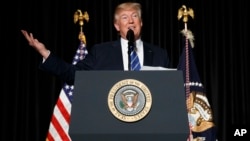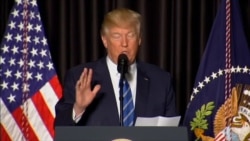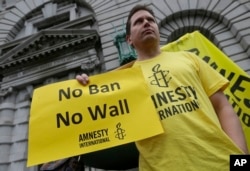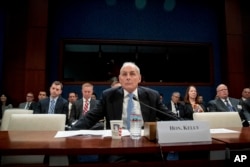U.S. President Donald Trump suggested to law enforcement chiefs Wednesday that politics led the courts to suspend his executive order on immigration and warned that the nation's security is being compromised without the travel restrictions.
"We are at risk because of what happened," Trump said at the winter conference of the Major Cities Chiefs Association in Washington.
"I don’t ever want to call a court biased so I won’t call it biased," Trump said.
Although the courts have yet to issue a final decision on the order, Trump said "the courts seem to be so political and it would be so great for our justice system if they would be able to read a statement and do what’s right."
WATCH: Trump on travel ban
A U.S. appeals court in San Francisco says it will likely rule this week on whether a federal judge had the legal grounds to suspend Trump's ban last month on immigration from seven Muslim majority countries.
A lawyer for the U.S. Justice Department and an attorney representing the states of Washington and Minnesota, which are suing to stop the ban, presented their arguments by telephone before a three-judge appellate panel Tuesday.
U.S. attorney August Flentje said Trump's executive order was well within his power granted by Congress and the Constitution, letting him set "adequate standards" in screening would-be travelers to the United States who need visas. Flentje pointed out that Congress and the former Obama administration determined that the seven countries named in the order -- Somalia, Sudan, Iran, Iraq, Libya, Syria and Yemen -- were of concern to authorities because they pose a risk of terrorism or give terrorists a safe haven.
He said a number of Somalis arrested in the United States have ties to al-Shabab terrorists.
Fast-moving case
The U.S. attorney acknowledged that the case has moved too fast to give the government enough time to provide all the evidence to support Trump's order. But he said the Washington state federal district judge's order last week putting it on hold was "over-broad" and overrode presidential authority.
Washington state Solicitor General Noah Purcell told the appeals court the Trump administration wants to reinstate the travel ban without a full judicial review, throwing the country "back into chaos."
When questioned what harm the travel ban has done to Washington state residents, Purcell said it separated families, stranded students overseas, and left people in doubt about whether they should travel because of the uncertainty of whether they could come back.
When challenged about whether the travel ban discriminated against Muslims because the vast majority are unaffected, Purcell argued that not every Muslim has to be hurt for it to be unconstitutional. He told the judges the president's order was designed in part to harm Muslims, noting that Trump called for a total ban on Muslim immigration during his campaign.
Attorneys general in 15 other states have filed briefs in support of Washington and Minnesota. The American Civil Liberties Union, nearly 100 corporations, and a group of Democrats that includes former Secretaries of State John Kerry and Madeleine Albright, also filed briefs.
All sides expect the issue to wind up before the Supreme Court.
U.S. District Court Judge James Robart's decision Friday suspending Trump's executive order has the president fuming.
"I actually can't believe that we're having to fight to protect the security, in a court system, to protect the security of our nation," Trump said Tuesday. He earlier tweeted that Robart is a "so-called judge" and that the American people should blame him and the court system if "something happens."
Kelly defends ban
Homeland Security Secretary John Kelly defended the ban. He took responsibility for its unwieldy rollout and mass confusion over who was covered by the ban and who should be allowed to enter the United States. He told the House Homeland Security Committee there was a lack of communication with Congress and that the travel ban should have been delayed "just a bit."
But he defended it against Democratic critics who call it a ban on Muslims, saying the terror risk, not religion, was the key factor in the president's order.
If the case eventually goes to the Supreme Court, the nation's highest judicial body, one analyst told VOA there are rulings from the past that could support Trump's policy.
New York-based attorney Dan McLaughlin, told VOA Persian’s New Horizon show "The Supreme Court has held for a long time that Congress has nearly unlimited authority in deciding who can enter the country — an authority that includes excluding people from particular countries, as it did with Chinese immigration in the 1880s.”
McLaughlin said, “Because the president is relying on an authority delegated to him by Congress, he has a broad authority to act on immigration within the law, whether you think his policy is wise or not."
But he added that Trump’s prominent advocacy of a U.S. ban on all immigration by Muslims could come back to weaken his case before the Supreme Court.
"There’s no question that the president has a legacy of comments that are going to make it more difficult for him to defend his executive order on immigration in court and the public," McLaughlin said.
Capitol Hill correspondent Katherine Gypson and reporters Mohammad Manzarpour, Parisa Farhadi contributed to this report









